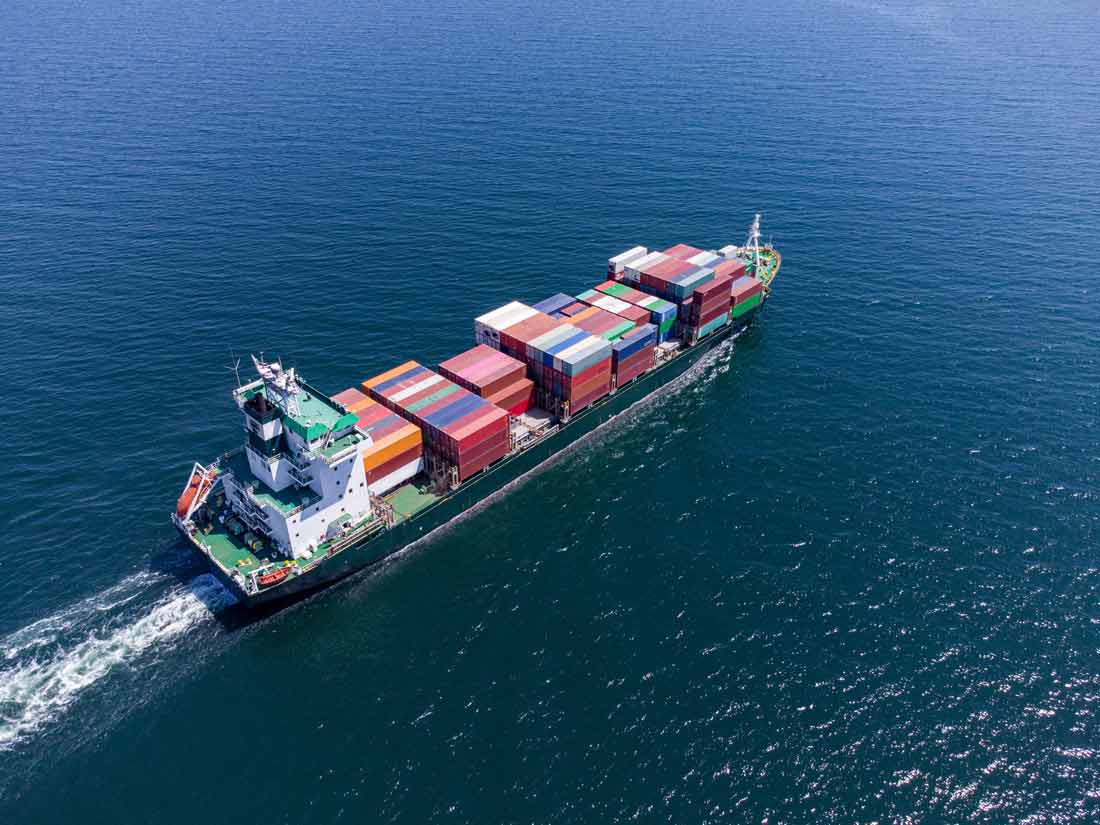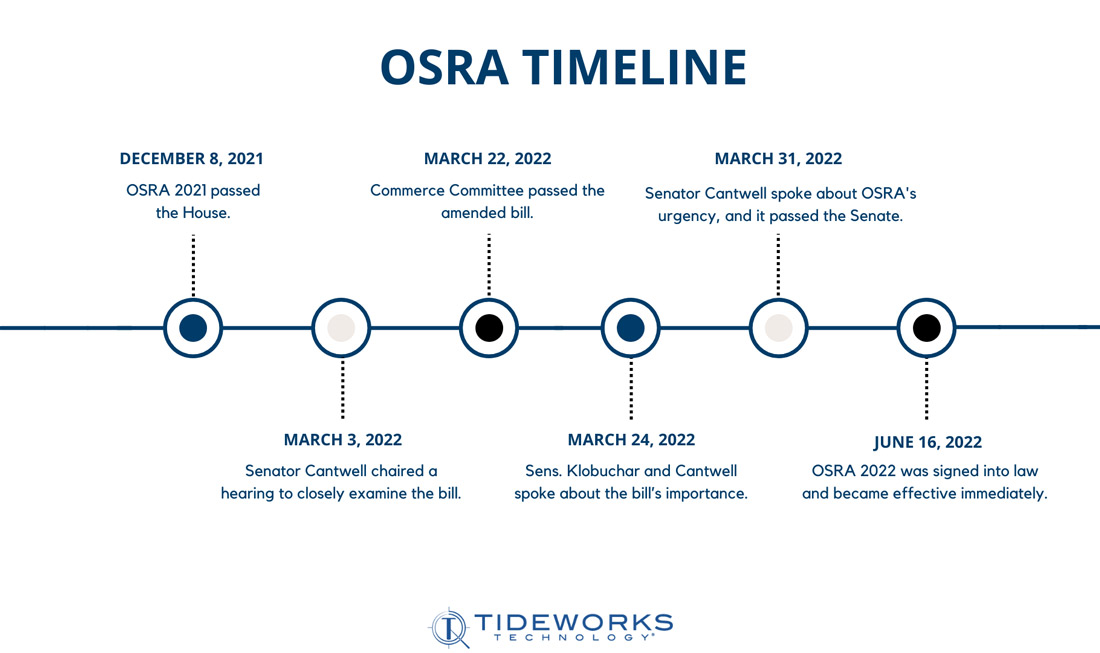
The Ocean Shipping Reform Act (OSRA) of 2022, S. 3580, was signed into law on June 16. The bill changes protocols for detention and demurrage (D&D) fees, prohibits carriers from declining U.S. exports unreasonably, and requires quarterly reporting procedures, among other reforms.
Detention is the charge per day and per container, until the empty container is returned to the shipping line’s depot, while demurrage is the charge per day and per container from the date of discharge until the full container is moved out of the port or terminal.
Notably, OSRA 2022 addresses shippers’ concerns over their interpretation of unfair D&D charges, granting greater agency to challenge them and shifting the responsibility of proving their reasonableness to ocean carriers or marine terminal operators. It also expands the scope of the Federal Maritime Commission’s (FMC) authority to investigate carriers’ business practices.
These changes all aim to address shipping price hikes, especially stemming from foreign-owned carriers. They also strengthen the maritime supply chain and reduce costs for end-consumers.
In this blog, we’ll walk through the context that led to OSRA, then dive into its objectives and implications for the shipping industry — especially terminals and their operators.
What Brought on the Ocean Shipping Reform Act?
OSRA 2022 was initially drafted to address the long-standing tension, dating back to 2014, over shipping laws impacting importers, exporters, docks, terminals, and other concerned entities. In particular, the primary motivation concerned D&D charges that some parties have considered unfair.
On the one hand, some shippers feel that D&D fines have often been assessed for circumstances outside their control. For example, a carrier could theoretically impose a D&D fine related to unforeseeable terminal congestion. On the other hand, docks and terminals that utilize D&D charges state they aren’t levying them indiscriminately but to counter-balance costs of lateness and capacity issues.
In 2020, increased demand and supply chain issues worsened delays and port congestion, exacerbating the situation with an increase in D&D charges.
Ultimately, the FMC released further guidance on the “unreasonable” designation that governs D&D charges. The Interpretive Rule explains the applicable nuances in the Shipping Act of 1984, amended in 1998 (see below for the full timeline). Initial fact-finding established that shippers should not be punished for situations like the one above.
Later, further investigation led to the legislative push for reform that became OSRA 2022.
Differences Between the House and Senate Bills
As it progressed through the House and Senate, OSRA took on various forms. All versions sought to address the issues noted above, but they differed in how they defined terms, granted authority, and stipulated requirements.
OSRA reconciles H.R. 4996 and S.3580 in the following important areas:
- D&D and related issues: The House bill puts a burden on carriers to certify D&D charge accuracy and maintain records post-facto, whereas the Senate bill prohibits invoicing and removes the burden of payment from charged parties without evidence.
- What is “Unreasonable”: The House bill specifies that the FMC will undertake a rulemaking process to determine the definition, whereas the Senate bill does not.
- Service Contract rules: The House bill empowers the FMC to set service contract terms and specifies carrier requirements; the Senate bill only empowers the FMC.
- Rules for Declining Cargo: The House bill prohibits carriers from impeding shippers’ access to cargo and grants the Coast Guard authority to determine safety. The Senate bill also prevents impediments to shipper access but doesn’t involve the Coast Guard.
Overall, the bills are more similar than different. S. 3580 tends to specify fewer provisions and defers to the FMC’s authority more freely, whereas H.R. 4996 is generally much more detailed.
Note: In the House, H.R. 4996 was also attached to seemingly unrelated bills about competition with Chinese microchip manufacturers (H.R. 4521) and Coast Guard reauthorization (H.R. 6865), which may explain language that was excluded from the Senate bill and, ultimately, the law.
The Ocean Shipping Reform Act Timeline
Although OSRA 2022 passed in 2022, its history reaches back at least 24 years. The first Ocean Shipping Reform Act (S. 414) passed the House in 1998 to amend the Shipping Act of 1984 (S. 47), promoting U.S. exports, competitiveness, and market reliance.
Here’s the journey OSRA has taken since then to become law:
- December 8, 2021: OSRA 2021 passed the House as H.R. 4996.
- March 3, 2022: Senator Maria Cantwell (WA) chaired a hearing to closely examine the bill.
- March 22, 2022: The Commerce Committee passed the amended bill.
- March 24, 2022: Senators Amy Klobuchar (MN) and Cantwell spoke about the bill’s importance.
- March 31, 2022: Senator Cantwell spoke about its urgency, and OSRA passed the Senate.
- June 16, 2022: OSRA 2022 was signed into law as Public Law No. 117-146 and became effective immediately.
Per the FMC’s Industry Advisory and Notice on Timing, certain provisions are self-executing, such as Section 7(a), which prohibits unreasonably refusing cargo space or applying unfair pricing or discriminatory methods on the basis of available cargo space or type of shipment.
Compliance with much of OSRA 2022 is required immediately, without a phase-in period.

The Main Objectives of OSRA 2022
Despite its background of D&D tensions, the most important objectives of OSRA 2022 are actually broader in scope and impact the entire shipping industry in two distinct ways:
- Protect U.S. exporters (and reduce inflation): Per the White House, OSRA 2022’s controls and regulations aim to protect U.S. exporters by targeting the “unfair practices” of global carrier alliances during the pandemic. This umbrella includes investigations into what’s been deemed as carriers’ “unjustified refusal” to negotiate cargo slots from U.S. exporters. The U.S. government also aims to reduce the inflation it partially attributes to pandemic-level ocean shipping costs and the ensuing burden on Americans.
- Decongest container terminals: Ukrainian consulting firm Informall BG considers this result “doubtful,” and states, “the U.S. logistics system must adapt to new market conditions, invest in the development of container terminals, port, and storage infrastructure in order to significantly affect congestion both on water and on land.”
Regardless of the objectives’ effectiveness, tighter restrictions on D&D charges will make it harder for both foreign-owned and domestic entities to impose any fines on U.S. shippers — legitimate or not.
The Main Implications of OSRA 2022
In practice, the actual implications of OSRA 2022 will vary depending on a stakeholder’s position within the shipping industry. In the long term, the law will likely impact price gouging. To try and prevent potentially unfair D&D charges, OSRA requires carriers and terminals to now present the burden of proof. Finally, carriers must report on their import and export tonnage at regular intervals to the FMC.
However, it’s unlikely that OSRA 2022 will have a major impact on logistics leaders in the short or long term. Per Gartner (and in agreement with Informall BG), the issues that matter most are structural, not technical. Legislation that closes loopholes will not alleviate issues like general market rates and overall port traffic.
It should be noted, though, that changes to the way FMC enforces its D&D charge compliance and other new requirements could be more significant for smaller entities than larger ones. For terminal operators, in particular, OSRA 2022 will necessitate greater attention to detail in recordkeeping, general marine terminal operations, and administrative management.
Get Ready for OSRA 2022 with Tideworks
The ink is still drying on the Ocean Shipping Rights Act of 2022, and the FMC has yet to fully complete key definitions and rules that’ll shape its impact on the shipping industry. That leaves room for uncertainty and gaps in reporting that could potentially lead to costly violations. To avoid them, terminals will need to optimize data collection and billing infrastructure.
That’s where Tideworks comes in. Tideworks is dedicated to helping terminal operators navigate OSRA 2022 compliance. Our marine Terminal Operating System (TOS), Mainsail, provides unmatched visibility over all cargo inventory and transactions, while Forecast, our marine customer service web portal, presents vital cargo information to terminal stakeholders and customers to improve turn times and communications. Our systems have been updated to align with OSRA requirements, and we will continue to monitor additional requirements as they come out, so you can be at ease knowing your terminal is compliant.
To learn more about how we can help your terminal, get in touch today.
